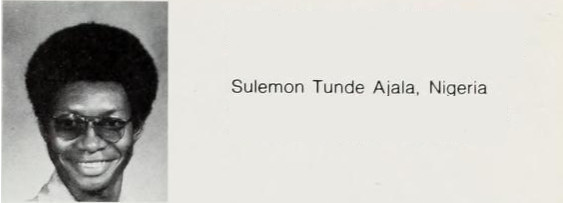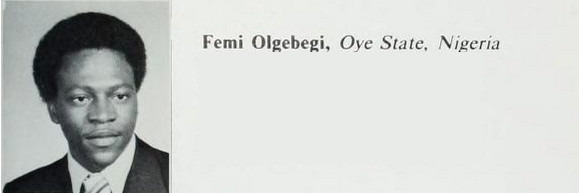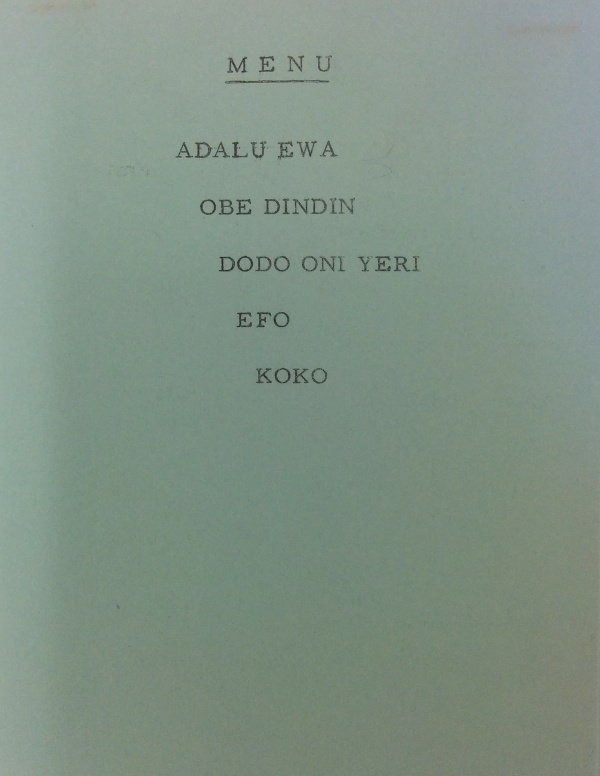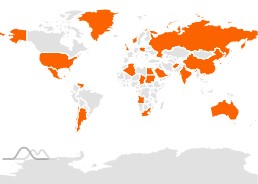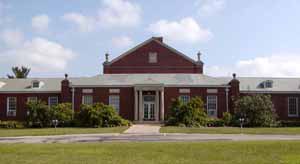Since at least 1939, Nigerian students have been attending the University of Illinois. Early Nigerian Illini have included accountants, actors, agriculturalists, agricultural economists, athletes, business administrators, chemists, dairy technologists, economists, educators, electrical engineers, entomologists, geographers, mechanical engineers, Olympic competitors, plant pathologists, political scientists, politicians, religious leaders, school administrators, student leaders, veterinarians, writers, and zoologists too.
Read on to learn more about early Nigerian Illini!
Illinois – Nigeria Connections
Multiple University professors’ work included either collaboration with colleagues in Nigeria or research based in Nigeria. Among the earliest of connections might have been Geology Professor Adrian E. Scheidegger’s geological research (Record Series 15/11/30) which featured many international sites including Nigeria. Around the same time there was also Agricultural Economics Professor Harold W. Hannah’s work in Nigeria (Record Series 8/4/34) which may have begun at least as early as his visit to Nigeria in 1959 and 1960. In February and March 1965, Biological Chemistry Professor Harry P. Broquist and Nutrition Professor Kenneth E. Harshbarger took a leave of absence to accept professional positions as governmental consultants on the nutritional status of civilians in Nigeria. [1] In 1964, two University students were members of a four-member “American Folk Quartet” good will tour which visited multiple Mediterranean countries and Nigeria as well. Of course, the CIC-AID Rural Development Research Project File (Records Series 8/4/40) includes multiple U.S. university collaborative projects with peer institutions in Nigeria during the 1960s. The Office of International Programs and Studies Director’s File (Record Series 24/2/5) currently documents collaborations with Nigerian colleagues during the 1960s and 1970s.
During the 1970s, connections would continue. At least as early as 1970, Yoruba language courses were offered. Plant Pathology Professor James B. Sinclair’s correspondence (Record Series 8/13/21) documents work in Nigeria too. In 1973, University of Ibadan Senior Lecturer Owodunni Teriba gave a campus talk titled, “Nigerian Economic Development: Changing Patterns and Policies”. In 1978, History Professor and Acting Director of the African Studies Program Charles C. Stewart (Record Series 15/13/41) was appointed an associate in the Center for Advanced study to write a critical review of nineteenth century Nigerian history. [2] More connections would increase over time and so too did student enrollment.
Students
The earliest Nigerian Illini may have arrived during the early 1940s. After beginning his studies at Lincoln University in Pennsylvania, Mr. Mbonu Ojike came to study at Illinois for one year and he would finish his degree at Ohio State University. While at Illinois, Mr. Ojike experienced Thanksgiving at the home of a professor, he gave a talk on how some Nigerians celebrate Christmas, and he worked as a janitor to pay for his living expenses in off-campus co-operative housing. In Mr. Ojike’s memoirs, My Africa and I Have Two Countries, researchers can read about his experiences in Illinois, the greater United States, and of course Nigeria too. In 1941, with two other African students, Mr. Ojike helped found the international organization African Students Association of the United States and Canada. [3]
Mr. Ojike’s memoirs and Daily Illini news reporting (including editorials) help document the benefits and detriments of student life during this time too. Nigerian Illini and other llini entered a segregated United States which meant limited or denied access to resources nationwide. Nigerian Illini joined other voices in protest. For example, in 1961, one student editorial cites a Nigerian colleague who was denied service at some local barber shops. A December 1966 editorial criticizes a DI caption for failing to appropriately contextualize an African student’s use of the word “negro”. In 1968, an editorial signed “Nigerian Students” argued that University publications better served diverse campus stakeholders by emphasizing bonds of friendship between groups rather than divisions between cultures. Two days later, another student published a rebuttal. Over time, Nigerian Illini would overcome these additional barriers and continue to enroll.
The first Nigerian Illini graduate might be Mr. Uzoechina “Uzo” Nwagbo, (B.S. Chemistry, 1950), of Onitsha, who came to Illinois after preparing at Achimota College (now Achimota School, in Accra, Ghana). In the 1949 mock, student UNESCO conference, as one of four Illinois representatives in a twenty-five midwestern institutional program, Mr. Nwagbo participated as the United States representative. The following spring, Mr. Nwagbo gave a talk titled “The Problems of Nigeria” for the World Federalist Movement student group on campus.
In 1954, Mr. Oladunjoye Akanbi Fashola, (M.A. 1956) came to campus, supported by a Danforth Foundation Graduate Fellowship, the Daily Illini reported. In 1955, at the Baldwin Human Relations Conference, Mr. Fashola was one of three discussion leaders on the “International Aspects of Human Relations”. In 1957, at the Student Senate Conference “The Worldwide Significance of Discrimination in the United States”, Mr. Fashola was part of a six-member panel including students, faculty, and guest speakers. In a 1961 DI Letter to the Editor, one research assistant tangentially lamented that a Nigerian colleague was denied service by local barbershops. In another DI Letter to the Editor, in 1962, another student cited a Newman International speech given by a Nigerian student which stated the personal difficulty of making cross cultural friendships.
Mr. Romanus Ohuche, (B.S. Electrical Engineering, 1962), of Okigioi, completed his bachelor’s degree at Illinois, before furthering his education in Iowa and later returning to Nigeria. In 1961, Mr. Ohuche was elected president of the Newman International group. In 1962, in a Student Senate, Student Rights Committee, Panel of Illini student event, multiple students of different cultural backgrounds were organized to discuss and to promote mutual understanding across campus, and Mr. Ohuche was the representative of foreign students interests on campus. At an NAACP meeting in April 1962, which discussed equal housing, Mr. Ohuche participated as a representative of the African Student Organization. In May 1962, Mr. Ohuche and other students were interviewed by the Daily Illini for their responses to a controversial proposal in New Orleans. In October 1962, Mr. Ohuche was interviewed for a DI feature article on the Association of International Students organization. Finally, on November 1962, just two years and one month after Nigerian independence, the DI published an article, written by Mr. Ohuche, that reflected on the significance of development and change in Nigeria.
After graduation, Mr. Ohuche continued his studies before later returning to Nigeria. [4] Mr. Ohuche completed a master’s degree and a doctorate at the University of Iowa, before teaching at Njala State University in Sierra Leone, then the University of Liberia in Monrovia, Liberia, then the Alvan Ikoku College in Owerri, Nigeria, and finally at the University of Nigeria in Nsukka where Dr. Ohuche became Dean of Education.
In 1964, at the annual Soccer Sports Club awards banquet, then hosted at Inman Hotel in Champaign, Mr. Moses Sumoyiwa () was presented the Sports Illustrated Trophy of Merit, citing his performance as one of college soccer’s highest single-game scorers for kicking six goals at the Midwestern Collegiate Conference match against the University of Chicago. After graduation, Mr. Sumoyiwa continued his studies at the University of Manitoba, where he completed a master’s degree in agricultural economics in 1974.
Mr. Oredola “Ore” A. Soluade, (B.S. Mechanical Engineering, 1965) was an active student leader. For the 1964 Africa Night event, Mr. Soluade and other Nigerian Illini sang and danced. In 1966, at a Y.M.C.A. seminar “Is Democracy on Its Way Out in Africa?”, Mr. Soluade was part of the five-member student panel. Mr. Soluade’s talk was reviewed as hopeful by a Daily Illini news reporter Sue Engel. The following month, in March, Mr. Soluade read Nigerian poetry, in multiple languages, at an off-campus literature event “A Literary Miscellany” organized by the student group Oblique.
Mr. Samuel Anyaegbu, (B.S. Agriculture, 1965), of Oboro, and Mr. Michael Egunjobi, (B.S. Agriculture, 1965), of Ilawe, Ekiti, both attended Western Illinois University, before coming to the University of Illinois. Both men left few records behind.
Omojola Ogunlade, (B.S. Mechanical Engineering, 1965), of Ayedun, Ekiti, and Mr. George Ojanuga, (B.S. Agriculture, 1965), of Lagos, left few records behind. From Daily Illini news reporting, we do know that Mr. Ojanuga was a member of the 1963-1964 Illinois varsity soccer club, and he joined the agricultural honorary fraternity Alpha Zeta in 1964.
Mr. Adegboyega Adewunmi, (B.S. Electrical Engineering, 1965), of Iraro, was a member of the 1963-1964 Illinois varsity soccer club too.
Mr. Ndarake Etuk, (B.S. Dairy Technology, 1966), of Ede Obom, left few records behind.
Mr. Adokiye Kombonimi, (B.S. Agriculture, 1966), of Bille, Degema, left few records behind too. Mr. Abiodun Odejayi, (B.S. Electrical Engineering, 1966), of Lagos, was one of multiple African Student Organization students interviewed by the DI regarding the Rhodesian Unilateral Declaration of Independence in November 1965.
Mr. Modiu Rabiu, (B.S. Agriculture, 1966), of Ijebu-Ode, was a member of the 1963-1964 soccer team too. Mr. Emmanuel Agwuna, (D.V.M., 1967), of Inyi, left few records behind; although, he could be the first Nigerian Illini veterinarian too.
Mr. Sulemon Ajala, (B.S., 1977) left few records behind. However, Mr. Charlton Ehizuelen, (B.S., 1978) of Benin City, has an exceptionally well-documented time at Illinois, through Daily Illini newspaper reporting of Mr. Ehizuelen’s athletics career. In the 1974 Illio, a two-page feature essay outlines and interviews Mr. Ehizuelen and his accomplishments.
Mr. Femi Olgebei, (B.S., 1979) and Mr. Oluyemi Ogunrinola (B.S., 1983) left few records behind. Mr. Victor Onafuye, (B.S. Aeronautical and Astronautical Engineering, 1980), later continued his education with an M.B.A. at Governors State University and a D.P.Th at Master’s Graduate School in Evansville, Indiana. Mr. Onafuye’s long career included being President and CEO of Pixel Information Technology Corporation and a pastor at the Apostolic Church of South Suburban Chicago. In 2012, Mr. Onafuye published the memoir Unequal Opportunity under the pen name Victor Jonathan.
Of course there were graduate students too. Some early Nigerian Illini graduate students have included Babatunde Abraham Williams, (PhD Political Science, 1959), Babatunde Omoniyi Ogundele, (PhD Accountancy, 1970), Helon Herron Fagbenle, (PhD Plant Pathology, 1973), Richard Olayiwola Fagbenle, (B.S. Mechanical Engineering, 1967; PhD Mechanical Engineering, 1973), Ginigeme Francis Mbanefoh, (PhD Economics, 1976), Anthony Izevbuwa Omo-Osagie, (PhD Physical Education, 1978), Titus Iloduba Eze, (M.S, 1979, PhD Education, 1981), Ehigie William Ebomoyi, (PhD Health and Safety Education, 1981), Abayomi Charles Daramola, (M.S. Communication, 1979; PhD Speech Communication, 1982), Mathurin Gbetibouo, (M.S. Agricultural Economics, 1978; PhD Agricultural Economics, 1983), John Paul Uko, (M.S. 1981; PhD Business Administration, 1983), Emezuo Ogbonna Irondi, (PhD Education, 1985), Arit Essien, (A.M. Theater, 1982; PhD Theater, 1985), Emeka A. Jerry Ogbudimkpa, (PhD Health and Safety Studies, 1986), Peter Ndidi Osegi, (PhD Art Education, 1988), Patrick Afamefuna Walson, (PhD Human and Community Development, 1989), Joseph Uduehi, (A.M. Art Education, 1984; EdD Education, 1993), Lucy Abosede Kehinde, (M.S. Agriculture Extension, 1987; M.B.A. 1994; PhD Education, 1994), Richard Djukpen, (PhD Geography, 2012), Kelechi Ibe-Lamberts (M.S. Community Health, 2012), Tolulope Agunbiade, (PhD Entomology, 2014), Emeka Anaza, (PhD Recreation, Sport, and Tourism, 2014), Ifeyinwa Uchechi Cindy Onyenekwu, (PhD Education Policy, Organization and Leadership, 2015), Oladipupo A. Ogunnubi, (M.S. Electrical and Computer Engineering, 2015), and Ucheoma Catherine Nwaozuru, (M.S. Community Health, 2016.
Organizations and Special Events
At least as early as 1952, Nigerian Illini organized the first Nigerian Night as part of the international dinners program of the off-campus Y.M.C.A. The event included student talks on agriculture, cultures, and education in Nigeria, including food, music, and dance too.
Over time, Nigerian Illini and others organized multiple Nigerian and African educational events on campus. In 1961, with Newman International, the Nigerian Students Group, organized a first anniversary for the Federation of Nigeria. During the program, Zoology graduate student Augustin Okoukwo gave the talk, “What Our Independence Means to Us”. The Daily Illini reported that the program included displays, music, and refreshments. At the 1964 International Fair, Nigerian students danced. In 1975, Nigerian Students and the African Studies program sponsored the panel discussion “The Military and Rural Development of Nigeria”.
Although documentation of Nigerian Illini after the 1970s is limited, student enrollment figures document that Nigerian Illini enrollment has continued since the 1960s and hopefully for longer too.
Are you a Nigerian Illini? Do you know someone who is? We’d like to hear from you! Please send us a message or leave a comment below. We want to include you and your story, as we celebrate the first 150 years of the University of Illinois.
Happy First 150 everyone!
(A special thank you to the officers and members of the 2016-2017 and 2017-2018 African Students Organization who invited me to their meetings and events, while supporting the development of this story and for sharing their stories too.)
References
[] As always, a special thank you to all students and staff whose tireless work for student life and publications (many of which are available at the University Archives) help preserve the memories of Illini everywhere.
[1] Meeting of the Board of Trustees of the University of Illinois, February 17, 1965, page 440, Record Series 1/1/802.
[2] February 15, 1978, page 533.
[3] For a scholarly overview of Mr. Ojike’s career, please see: “Mbonu Ojike: An African Nationalist and Pan-Africanist” by Gloria Chuku, found in The Igbo Intellectual Tradition: Creative Conflict in African and African Diasporic Thought, edited by Gloria Chuku.
[4] “IBU ANYỊ NDANDA: The Centrality of Education in Igbo Culture“, by Professor Romanus Ogbonnaya Ohuche, 1991 Ahiajoku Lecture, IgboNet: The Igbo Network.












